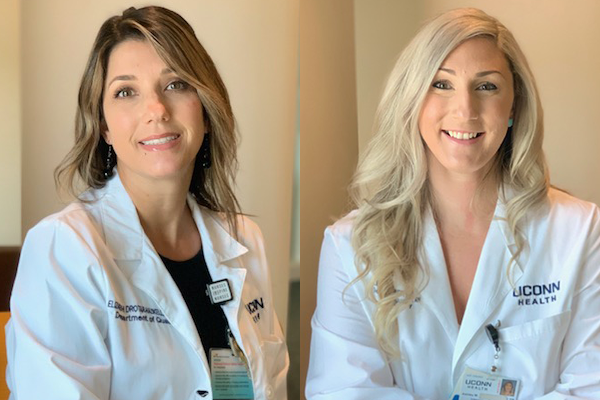With COVID-19 so pervasive, it’s understandable how other serious medical problems could have a diminished presence in our consciousness. But nurses Elizabeth Haskell and Ashley Brennan-McBride have been keeping their focus on one particular condition.
They make up UConn Health’s sepsis team, charged with the task of mitigating the risk and reducing the mortality of sepsis, a potentially life-threatening illness in which infection triggers an adverse reaction that can lead to our own immune system essentially turning on us.
“It can result from any infection, and is the leading cause of mortality and readmission,” Haskell says. “Therefore, we must all remain aware and vigilant in identifying and treating sepsis in a timely manner.”
Sepsis is a relatively common threat to hospitalized patients, and has become a priority for hospitals nationwide.
“Every hour that elapses without antibiotics increases mortality by 8 percent,” Brennan-McBride says. “Sepsis can lead to death if not recognized early and treated quickly and appropriately.”
UConn Health established its own sepsis team and assigned Brennan-McBride and Haskell to it earlier this year, before the pandemic took hold.
“Both of us have critical care and emergency background experience, and so we’re very familiar with these patients and the different comorbidities and how ill they can get,” Haskell says. “Early recognition and early therapy are really key elements in treating sepsis and preventing mortality. That really is what our job is focusing on.”
“Our role provides real-time surveillance of sepsis patients and allows us to intervene when appropriate,” Brennan-McBride says. “We do so through collaboration with providers and nurses to ensure we are meeting our quality metrics for sepsis care.”
It’s too soon to quantify the success of their efforts at UConn Health, and officially reported sepsis metrics lag to the previous fiscal year. But early signs are promising.
“We do internal tracking and have seen a significant improvement in sepsis core metrics, and anticipate that our statistics will show a favorable trend in the near future,” Haskell says.
Sepsis is a concern that long predates COVID-19. While COVID-19 can lead to sepsis, this is most likely the result of bacterial infection in a person with COVID-19 rather than from the SARS-CoV-2 virus itself.
“We still have much to learn about this relationship and the risk of sepsis among individuals with COVID-19,” says Dr. David Banach, UConn Health hospital epidemiologist. “What is clear is that sepsis prevention and early recognition and treatment are especially important among this particularly vulnerable population.”



